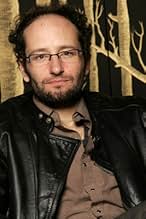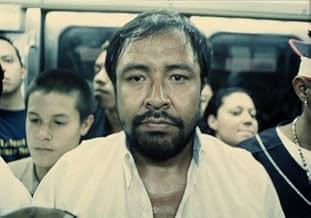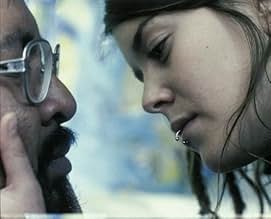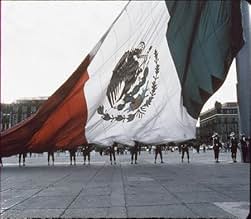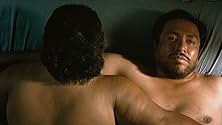IMDb RATING
5.5/10
6.9K
YOUR RATING
Marcos lusts after his boss's promiscuous daughter, but after botching an extortion scheme, he becomes wracked with guilt.Marcos lusts after his boss's promiscuous daughter, but after botching an extortion scheme, he becomes wracked with guilt.Marcos lusts after his boss's promiscuous daughter, but after botching an extortion scheme, he becomes wracked with guilt.
- Awards
- 1 win & 3 nominations total
- Director
- Writer
- All cast & crew
- Production, box office & more at IMDbPro
5.56.8K
1
2
3
4
5
6
7
8
9
10
Featured reviews
Refreshing (and realistic) proposal for Mexican directors
As a Mexican, it is very exciting for me to find new proposals for Mexican modern films.
Unfortunately, must of the current Mexican movies are taking the same Hollywood recipe: beautiful actors, violence, soundtracks of well known Latin groups... Batalla en el Cielo does not follow this. The director, Carlos Reygadas, is a person that really wants to show what he has in mind, and does not care about considering distracting elements for having a greater impact in the audience.
I am against the use of sex for attracting audience to a film. However, I really think that some (not all) of the sex scenes of this movie were really part of the story. Also, showing sex as it is (not always as idealistic and esthetic as Hollywood has taught us) is an interesting proposal!
I consider that one of the main achievements of this movies is to show many cultural traits of my country:
-The view of the Catholic religion as a resource to erase the mistakes one has made: "you can do whatever you want, don't worry about the effects because God will always help you"
-The notorious gap between rich and poor people: when Ana refers to Jaime's servant as "la gata" in such a despective -but common- way.
-The double morale managed by Mexican: how can a prostitute, as Ana, can be a moral leader over Marcos's acts?
-The informal commerce (Marcos and his wife sold merchandise in the subway).
-The love for soccer (what can I say about that, if I love it?)
-Cheating on your partner
-The lifestyle in Mexico City, with its traffic jams, way people behave in the subway, neurotic people, kidnaps.
All the issues above are part of the Mexican life.
Personally, I consider the following opportunity areas:
-Not all the music that was used was OK. Sometimes it was too "belic" for me , but at least it is according to the scenes and most of it does not follow the marketing intentions to make you buy a soundtrack
-The audio quality should have been improved (it was not easy to understand, even for people used to the way people from Mexico City speak!)
-Some (very few!) parts were too slow... but considering Reygadas's style, I might think that it is part of his professional charm.
I like to see a different proposal. I would recommend this film to people that, at the time that they leave the theater, really want to think about human nature, rather than thinking if it was an erotic or violent film.
I hope my comment has been useful...
Unfortunately, must of the current Mexican movies are taking the same Hollywood recipe: beautiful actors, violence, soundtracks of well known Latin groups... Batalla en el Cielo does not follow this. The director, Carlos Reygadas, is a person that really wants to show what he has in mind, and does not care about considering distracting elements for having a greater impact in the audience.
I am against the use of sex for attracting audience to a film. However, I really think that some (not all) of the sex scenes of this movie were really part of the story. Also, showing sex as it is (not always as idealistic and esthetic as Hollywood has taught us) is an interesting proposal!
I consider that one of the main achievements of this movies is to show many cultural traits of my country:
-The view of the Catholic religion as a resource to erase the mistakes one has made: "you can do whatever you want, don't worry about the effects because God will always help you"
-The notorious gap between rich and poor people: when Ana refers to Jaime's servant as "la gata" in such a despective -but common- way.
-The double morale managed by Mexican: how can a prostitute, as Ana, can be a moral leader over Marcos's acts?
-The informal commerce (Marcos and his wife sold merchandise in the subway).
-The love for soccer (what can I say about that, if I love it?)
-Cheating on your partner
-The lifestyle in Mexico City, with its traffic jams, way people behave in the subway, neurotic people, kidnaps.
All the issues above are part of the Mexican life.
Personally, I consider the following opportunity areas:
-Not all the music that was used was OK. Sometimes it was too "belic" for me , but at least it is according to the scenes and most of it does not follow the marketing intentions to make you buy a soundtrack
-The audio quality should have been improved (it was not easy to understand, even for people used to the way people from Mexico City speak!)
-Some (very few!) parts were too slow... but considering Reygadas's style, I might think that it is part of his professional charm.
I like to see a different proposal. I would recommend this film to people that, at the time that they leave the theater, really want to think about human nature, rather than thinking if it was an erotic or violent film.
I hope my comment has been useful...
Very affecting, bitter sweet movie
For two thirds of this film I was spellbound and then it suddenly span away from me. Listening to the director speaking afterwards, I think I know what went wrong and I shall have to view again some time to find out. It is all very watchable but slightly confusing towards the end, which is a shame and may be my fault, that of the director or even of Mexico itself. Whilst I have never been to the country it did seem that part of the lifeblood of this movie was the tangled city of contradictions itself. Even though not perfect in my eyes there was enough to show that this is a director of keen and original talent who will produce much more. His liking to work with non actors is welcome and his treatment of actual graphic sex is stunning. Very affecting, bitter sweet movie.
"Battle in Heaven" describes no battles
This film is about a man and wife, who kidnapped a friend's baby for ransom. However, the baby died, and they have to live with the consequences.
The plot outline describes a promising start of an emotional drama. It could have been a captivating story if it was elaborated well. However, the plot ends there. The filmmakers ran out of ideas of what to do, and hence film a car driving around the city for minutes, or film the urban apartment blocks from a rooftop. Or throw in some sex scenes to keep viewers interested.
There is almost no portrayal of Ana and Marco's states of mind after the kidnapping goes wrong. There is no description of the victim's family's grief. Instead, the film wanders around aimlessly and pointlessly. It fails to engage, captivate or evoke any emotions. "Battle in Heaven" describes no battles. It lacks any redeeming value, and I strongly suggest staying away from it.
The plot outline describes a promising start of an emotional drama. It could have been a captivating story if it was elaborated well. However, the plot ends there. The filmmakers ran out of ideas of what to do, and hence film a car driving around the city for minutes, or film the urban apartment blocks from a rooftop. Or throw in some sex scenes to keep viewers interested.
There is almost no portrayal of Ana and Marco's states of mind after the kidnapping goes wrong. There is no description of the victim's family's grief. Instead, the film wanders around aimlessly and pointlessly. It fails to engage, captivate or evoke any emotions. "Battle in Heaven" describes no battles. It lacks any redeeming value, and I strongly suggest staying away from it.
Redemption
There are many redeeming qualities about this movie, and I think it's better than most people are making it out to be. I really hope the idea of a struggle for redemption comes through. It did for me. If it does, then the film, in my view, succeeds in telling the story that it should. I should mention, the opening scene really pulled me in. How could it not, being graphic and striking? Some people might think it was gratuitous. I think it was integral to the story.
Element after element, plot event after event set the tone for a story that is being told. I could really appreciate the commentary about the extremes some people may go to (kidnapping) in Mexico. It's not an ordinary topic, and it's treated very well. Very creative. Including the title which I thought was very suitable for the film.
Give this a try. It's good if you're in the mood to get a slice of life of Mexico. I think it does just that in a creative and entertaining way!
Element after element, plot event after event set the tone for a story that is being told. I could really appreciate the commentary about the extremes some people may go to (kidnapping) in Mexico. It's not an ordinary topic, and it's treated very well. Very creative. Including the title which I thought was very suitable for the film.
Give this a try. It's good if you're in the mood to get a slice of life of Mexico. I think it does just that in a creative and entertaining way!
Fantastic Film..
This not an easy picture. It requires Patience and commitment. It's a poetic movie about the urban heaven. About real people. About love and about madness. Reygadas is truly an author. He turns a conventional history in to a great ride through emotions, feelings and in to the overwhelming city of Mexico. Either you love it or hate it, no one comes out of the theater without a comment or a reaction. The movie has the power to move you in a positive or in a negative way. And i guess that something to be thankful about. Mexican films, in recent years, are mostly easy going urban comedies. This totally different. A prove that we can make different stories that reflect the sometimes surreal life of our country. This is one of them. With no professional actors, the movie feels honest and. The cast it's in a very natural level. The Sex scenes are not as important as they seem. Sex is finally a part o who we are, and we are use to see great bodies making love on the screen. It's not easy to see real people doing it, because we may see ourselves in them. And when someone throws your reality at your face, you can hate it. But Batalla En el Cielo does that and even more: Takes that reality to another lever and turns it in to poetry. And that it's just fantastic.
Did you know
- TriviaWriter/director Carlos Reygadas shot crowded street scenes in the middle of real crowds. Cameraman Diego Martínez Vignatti sat in a wheelchair and they just pushed him through everyone. Luckily, no one who passed by looked into the camera lens.
- GoofsDuring the scene where Ana and Marcos are making love, as the camera pans out, a crew member's reflection can be seen in the window.
- ConnectionsEdited into Samo je zemlja ispod ovog neba (2009)
- SoundtracksThe Protecting Veil
Written by John Tavener
Naxos Rights International
Chester Music Limited
Premiére Music Group
- How long is Battle in Heaven?Powered by Alexa
Details
Box office
- Budget
- €1,601,792 (estimated)
- Gross US & Canada
- $70,899
- Opening weekend US & Canada
- $20,351
- Feb 19, 2006
- Gross worldwide
- $258,227
- Runtime
- 1h 38m(98 min)
- Color
- Sound mix
- Aspect ratio
- 1.85 : 1
Contribute to this page
Suggest an edit or add missing content



